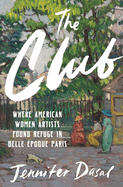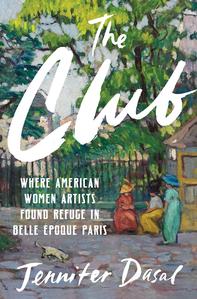
 Reading The Club: Where American Women Artists Found Refuge in Belle Époque Paris is like being slipped the password to a speakeasy or directions to an exclusive art show happening in a bohemian corner of Paris. The "Club" referenced in the title was a subsidized living and social space in Paris for young American woman artists of the Belle Époque era, which spanned the years between 1870 and 1914, prior to World War I. It offered young women a space of their own where they could pursue their artistic studies, and held luxurious common spaces of salons, libraries, and its own much-touted affordable restaurant, all located at 4 Rue de Chevreuse in the sixth arrondissement.
Reading The Club: Where American Women Artists Found Refuge in Belle Époque Paris is like being slipped the password to a speakeasy or directions to an exclusive art show happening in a bohemian corner of Paris. The "Club" referenced in the title was a subsidized living and social space in Paris for young American woman artists of the Belle Époque era, which spanned the years between 1870 and 1914, prior to World War I. It offered young women a space of their own where they could pursue their artistic studies, and held luxurious common spaces of salons, libraries, and its own much-touted affordable restaurant, all located at 4 Rue de Chevreuse in the sixth arrondissement.
Author Jennifer Dasal, an art lecturer and host of the ArtCurious podcast, traces the origins and evolutions of the American Girls' Club for Artists under the steady hand of Elisabeth Mills Reid, a philanthropist and wife to Whitelaw Reid, the U.S. minister to France at the time, and Helen Newell, wife of the pastor of St. Luke's Chapel in Paris. The impetus for the organization was to keep these young women safe in what was perceived to be a somewhat dangerous and potentially corrupting urban environment.
Dasal paints an engaging picture deeply rooted in primary sources and with seamless integration of archival materials, personal letters, and contemporary accounts. One text, from the letters of sculptor and future suffragette Alice Morgan Wright, breathes life into the experiences the young women had and what the club meant to them: "I don't wish to present the club to you as 'all honey and all jam' which it ain't, but I do think that, to a marvelous extent are eliminated for us there the discomforts which other people in the Quarter have to put up with--the thousand little and big drawbacks which I could not begin to enumerate."
Dasal also provides occasional entertaining historical asides, like the previous uses made of the building itself before Reid secured it for use as the Club. All told, this is a joyful and vibrant portrait of individuals with aspirations, struggles, and triumphs, whose stories Dasal makes resonate with contemporary readers. And it's an illustration of the profound impact that a secure space and community can have on the lives and careers of its members, which is as true now as during transformative moments in the past. --Elizabeth DeNoma, executive editor, DeNoma Literary Services, Seattle, Wash.
Shelf Talker: The Club is a captivating look at a glamorous and singular part of the history of women in the arts, and a testament to the power of community and support.

